

10 Reasons Why Democracy Doesn’t Work. Politics It is an accepted fact that liberal democracy is the worst possible political system—except for all others (thank you, Sir Winston).
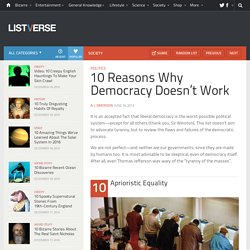
This list doesn’t aim to advocate tyranny, but to review the flaws and failures of the democratic process. We are not perfect—and neither are our governments, since they are made by humans too. It is most advisable to be skeptical, even of democracy itself. BASIC PRINCIPLES OF DEMOCRATIC GOVERNMENT. Organizations, whether they are homeowners associations or the local PTA, have discovered that governments which govern best are those who have laws which protect the rights of those governed and limit the powers of those who govern.
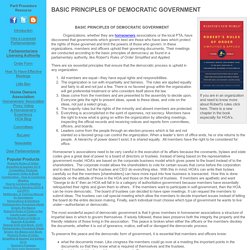
In these organizations, members and officers uphold their governing documents. Their meetings are conducted according to the basic principles of democracy as found in a parliamentary authority, like Robert’s Rules of Order Simplified and Applied. There are six essential principles that ensure that the democratic process is upheld in any organization.
All members are equal—they have equal rights and responsibilities. The organization is run with impartiality and fairness. Homeowner’s associations need to be very careful in the execution of its affairs because the covenants, bylaws and state codes give a great deal of power to a board of directors or trustees. What the documents mean. Democratic governance. Democratic governance is the bedrock of the OSCE’s system of values and standards.
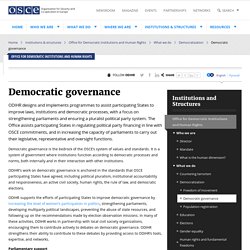
It is a system of government where institutions function according to democratic processes and norms, both internally and in their interaction with other institutions. ODIHR's work on democratic governance is anchored in the standards that OSCE participating States have agreed, including political pluralism, institutional accountability and responsiveness, an active civil society, human rights, the rule of law, and democratic elections. Good governance. Good governance is an indeterminate term used in international development literature to describe how public institutions conduct public affairs and manage public resources.
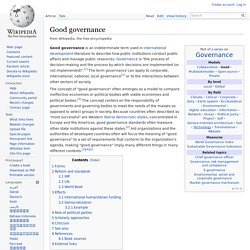
Governance is "the process of decision-making and the process by which decisions are implemented (or not implemented)".[1] The term governance can apply to corporate, international, national, local governance[1] or to the interactions between other sectors of society. The concept of "good governance" often emerges as a model to compare ineffective economies or political bodies with viable economies and political bodies.[2] The concept centers on the responsibility of governments and governing bodies to meet the needs of the masses as opposed to select groups in society.
List of forms of government. Ever wondered what all those ...ocracies and ...archies were?
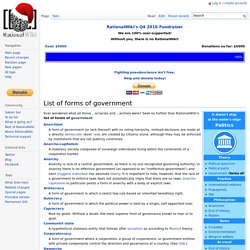
Seek no further than RationalWiki's list of forms of government. Anarchism A form of government (or lack thereof) with no ruling hierarchy, instead decisions are made at a directly democratic level: laws are created by citizens alone, although they may be enforced by institutions that are not publicly controlled. Anarcho-capitalism A stateless society composed of sovereign individuals living within the constraints of a corporatist market. Anarchy Anarchy is lack of a central government, as there is no one recognized governing authority; in anarchy there is no effective government (as opposed to an "ineffective government") and each (rugged) individual has absolute liberty.
Aristocracy A form of government in which a select few rule based on inherited hereditary right. Autocracy A form of government in which the political power is held by a single, self-appointed ruler. Capracracy Rule by goats. Communist state Corporatocracy Demarchy. State and Local Governments: Democracy at Work? Although their composition and rules may vary from state to state, state legislatures have a common function: to propose legislation and enact laws that apply to their state.
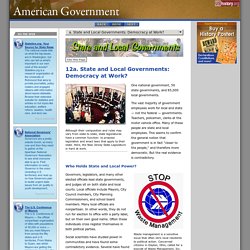
Here, the New Jersey State Legislature is hard at work. One national government, 50 state governments, and 85,000 local governments. The vast majority of government employees work for local and state — not the federal — governments. Teachers, policemen, clerks at the motor vehicle office. Many of these people are state and local employees. Who Holds State and Local Power? Waste management is a sensitive issue that often stirs local residents to political action. What is Democracy? Democracy. According to political scientist Larry Diamond, it consists of four key elements: The term originates from the Greek δημοκρατία (dēmokratía) "rule of the people",[4] which was found from δῆμος (dêmos) "people" and κράτος (krátos) "power" or "rule", in the 5th century BC to denote the political systems then existing in Greek city-states, notably Athens; the term is an antonym to ἀριστοκρατία (aristokratía) "rule of an elite".
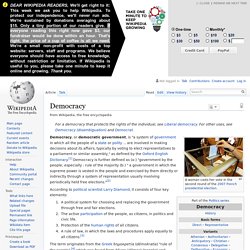
While theoretically these definitions are in opposition, in practice the distinction has been blurred historically.[5] The political system of Classical Athens, for example, granted democratic citizenship to an elite class of free men and excluded slaves and women from political participation. Democracy contrasts with forms of government where power is either held by an individual, as in an absolute monarchy, or where power is held by a small number of individuals, as in an oligarchy. Characteristics[edit] History[edit] Ancient origins[edit] Middle Ages[edit] Robert A.
Does democracy work? Alexander Hamilton, one of the framers of the U.S.
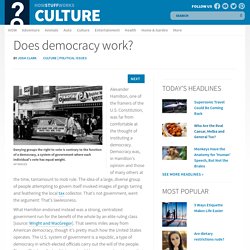
Constitution, was far from comfortable at the thought of instituting a democracy. Democracy was, in Hamilton's opinion and those of many others at the time, tantamount to mob rule. The idea of a large, diverse group of people attempting to govern itself invoked images of gangs tarring and feathering the local tax collector. That's not government, went the argument: That's lawlessness. What Hamilton endorsed instead was a strong, centralized government run for the benefit of the whole by an elite ruling class [source: Wright and MacGregor].
A true democracy is slightly different. In this sense, the U.S., which serves as the model for democracies around the world, can't use its 250 years of existence as proof that democracy works in practice.